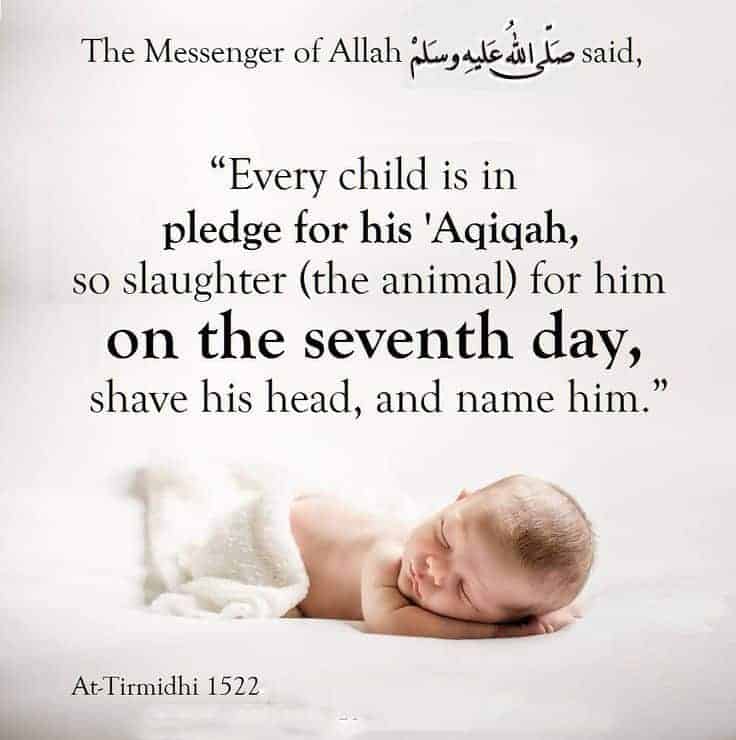
Manners of Welcoming New-Born Child in Islam According to Quran and Hadith

Children are a source of delight and embellishment for the world granted by Allah Almighty to their parents. The innocent kids give strength to the hearts, joy to the souls and pleasure to the eyes to their parents. Holy Prophet Muhammad (PBUH) said: “Marry the loving and fertile because, through you, I will compete with the nations for superiority in numbers.” (Abu Dawood)
Parents should bring up their children upon righteousness so that the parents will benefit from them during their lives and after their death. We should congratulate the Muslim parents on the birth of their child because this gesture creates an atmosphere of love and compassion among Muslim families. Allah Almighty mentions this good news being conveyed to a number of His Prophets, such as Zakariyyaa’ of his son Yahiya, may Allah exalt their mention. Allah Almighty says in the Holy Quran: “So the angels called him while he was standing in prayer in the chamber, ‘Indeed, Allah gives you good tidings of John, confirming a word from Allah and [who will be] honorable, abstaining, and a prophet from among the righteous’.” (Quran, 3:39)
Muslims should say Adhan in the right ear and Iqamah in the left ear of the new-born child. The significance of saying the Adhan and the Iqamah in the ears of the new-born child is that the first words he/she hears declare the greatness and majesty of Allah (SWT). This is an announcement of the religion of Islam. Besides, at the sound of Adhan and Iqamah, Satan distances himself. This call prevents provocation by Satan and ensures an intact faith.

After saying Adhan and Iqamah Muslims perform Tahneek that is the practice of chewing date and applying a part of the chewed portion to the palate of the child so that it goes down the child’s mouth easily. If the date is unavailable, one may apply anything sweet, like honey or juice, to the child’s palate. Tahneek is the Sunnah of that needs to be fulfilled. The veins and the muscles of a new-born child are strengthened in this way.
Naming a child is very important in people’s lives because the name is a title which says something about him/her, and is essential for communicating with him/her. The new-born may be named on the day of its birth, third day, or later on the seventh day, as this is what is clear after study of all the evidence from the Sunnah of Prophet Muhammad (SAW). It is the father or the mother who choose the name for the new-born child. If they differ amongst themselves then it is the father who has the choice to name his child. This is the right of the father because the child is ascribed and attributed to the father, as Allah Almighty says in the Holy Quran: “Call them by [the names of] their fathers; it is more just in the sight of Allah…” (Quran, 33: 5)
Ibn Umar, Abu Hurairah, Anas (RA) reported that the Prophet Muhammad (SAW) said: “Indeed, the best and most beloved names to Allah are: Abdullah and Abd-ur-Rahman. The most truthful names are al-Harith (cultivator) and Hammam (planner). The ugliest is Harb (war) and Murrah (bitter).” (Muslim)
After the seventh day of the arrival of the new-born child, as a form of welcome for it and to give thanks to the One who gave the blessings that is Allah (SWT), it is prescribed to slaughter a sheep. The Messenger of Allah Prophet Muhammad (SAW) said: “Every child is in pledge for its ‘Aqeeqah which is sacrificed for it on its seventh day, and it is named on it, and its head is shaved.” (Abu Daawood)
On the seventh day after the birth, the head of the new-born baby should be shaved. So when Al-Hasan was born, the Prophet Muhammad (SAW) told his daughter, Hazrat Fatimah (RA): “Shave his head and give the weight of his hair in silver to the poor.” (Ahmad)
It is recommended that the boy be circumcised, the circumcision should take place on the seventh day, but it is obligatory to circumcise before the boy reaches puberty.




